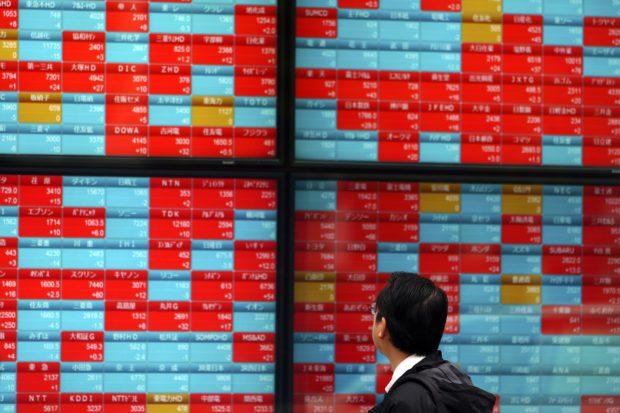Asian stocks gain on report Trump plans tariff delay
BEIJING – Asian stock markets were mostly higher Wednesday following a report that President Donald Trump might delay a weekend tariff hike on Chinese goods.

A man looks at an electronic stock board showing Japan’s Nikkei 225 index at a securities firm in Tokyo Wednesday, Dec. 11, 2019. (AP Photo/Eugene Hoshiko)
Benchmarks in Shanghai, Hong Kong and Southeast Asia rose while Tokyo declined.
Investors had been counting on Trump to postpone Sunday’s duty increase on $160 billion of Chinese imports. But with no official action, Wall Street fell for a second day Tuesday.
The Wall Street Journal reported Trump’s advisers were making preparations for to postpone punitive duties on smartphones, laptop computers, toys and other goods but said the president had yet to make a decision.
“Markets hope that the tariff can is kicked down the road while talks are underway,” said Vishnu Varathan of Mizuho Bank in a report. However, he warned, such hopes are “tentative if not fragile” with no commitment from Trump.
The Shanghai Composite Index rose 0.1% to 2,920,85 and Hong Kong’s Hang Seng gained 0.3% to 26,509.25. Tokyo’s Nikkei 225 shed 0.2% to 23,368.83.
South Korea’s Kospi gained 0.4% to 2,107.27 and Sydney’s S&P-ASX 200 added 0.5% to 6,737.50. Taiwan and Singapore advanced while New Zealand retreated.
On Wall Street, the benchmark S&P 500 index slipped 0.1% to 3,132.52. The Dow Jones Industrial Average lost 0.1% to 27,881.72 and the Nasdaq composite fell 0.1% to 8,616.18.
Investors also are looking ahead to the U.S. Federal Reserve’s decision Wednesday on interest rates and a similar decision Thursday by the European Central Bank.
Both are expected to affirm a commitment to low rates to support economic growth.
Elsewhere, markets are watching Britain’s parliamentary election Thursday. Prime Minister Boris Johnson called the election two years before it was required in hopes of a gaining a majority in the House of Commons to support his plan to leave the European Union by the end of January whether or not the two sides have negotiated details of their future relations.
The biggest risk for stocks has been the U.S.-Chinese tariff fight over Beijing’s technology ambitions and trade surplus. It has weighed on global commerce and threatens to depress economic growth.
On Thursday, Democrats in the U.S. House of Representatives and the White House announced a revised trade deal with Mexico and Canada. The deal would replace the North American Free Trade Agreement and would offer more provisions for U.S. workers.
ENERGY: Benchmark U.S. crude lost 33 cents to $58.91 per barrel in electronic trading on the New York Mercantile Exchange. The contract gained 22 cents on Tuesday to $59.24. Brent crude, used to price international oils, fell 44 cents to $63.90. It added 9 cents the previous session to $64.34.
CURRENCY: The dollar edged down to 108.73 yen from Tuesday’s 108.74 yen. The euro gained to $1.1094 from $1.1091.